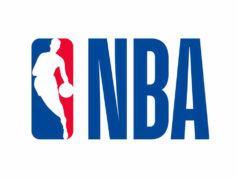Yesterday came with news of yet another departure from Team USA’s contingent to the World Cup. Granted, Kyle Lowry’s pullout wasn’t a surprise; continuing convalescence from surgery to his thumb last month had kept him out of training camp. Nonetheless, it served to strengthen the prevailing narrative that suiting up for flag and country isn’t as fulfilling as it used to be; the premise may be unfair, but there can be no questioning the numbers. Of the 35 names USA Basketball announced as part of its national team pool last year, only four remain.
Certainly, the holdovers are only too glad to be donning red, white, and blue in China late this month. And, so far, Kemba Walker, Khris Middleton, Harrison Barnes, and Myles Turner have been holding their own; if nothing else, the Blue vs. White scrimmage over the weekend underscored their importance to the cause. At the same time, it’s fair to note that the talent gap between the United States and the rest of the hoops-loving world remains so wide that sending in third stringers won’t matter in the final analysis. Gold continues to be the most probable outcome.
Of course, USAB isn’t around simply for the here and now. If anything, its more important purpose is to ensure the there and then. And it came into being precisely because, not too long ago, US dominance in the sport became threatened by the opposition’s well-designed initiatives emphasizing the value of the collective over individual strengths. Which, from the outside looking in, makes the recent rash of withdrawals concerning. The country’s superstars should keep wanting to play for pride in international competition, not deeming a waste the time they will spend doing so.
Parenthetically, USAB managing director Jerry Colangelo is right to point out the importance of “player equity” in determining rosters for future events, including the Olympics. If he has continually emphasized how much participation in other tournaments for Team USA is worth, it’s because he aims for continuity and wants those toiling for the World Cup to also consider it as an investment. It’s just too bad he missed emphasizing the point by denying Carmelo Anthony, the most decorated American in international competition, a spot in the lineup headed to China.
Again, there’s really no denying the inevitable. The Star Spangled Banner will be playing during the awarding ceremonies this time next month. And the scenario will likely be the same in the Tokyo Games next year. Still, the USAB’s ultimate objective is to deal in certainty, and the spate of absences shows it has a long, long way to go.
Anthony L. Cuaycong has been writing Courtside since BusinessWorld introduced a Sports section in 1994. He is a consultant on strategic planning, operations and Human Resources management, corporate communications, and business development.



